
Tactics Ogre Reborn originally came out back in 1995 as Tactics Ogre: Let Us Cling Together on the SNES. While not as highly regarded as Final Fantasy Tactics, it has made its own mark on the tactics community. Since then, it has received two remakes, one by the same name on the PSP, and the recently released Tactics Ogre Reborn.
Tactics Ogre Reborn starts off with the protagonist Denam, his sister Catiua, and his friend Vyce. Their home has been destroyed last winter and they’re seeking revenge against the Dark Knights. They get news that their captain is walking through the village, that they’re hiding out, and they decide to take the chance at their revenge. After battling, they realize that they have the wrong Lanselot, and that they are actually fighting against mercenaries. Understanding of the mixup, the mercenaries offer to help them break out Duke Robert from captivity, which will help the Resistance get a foothold in the war.
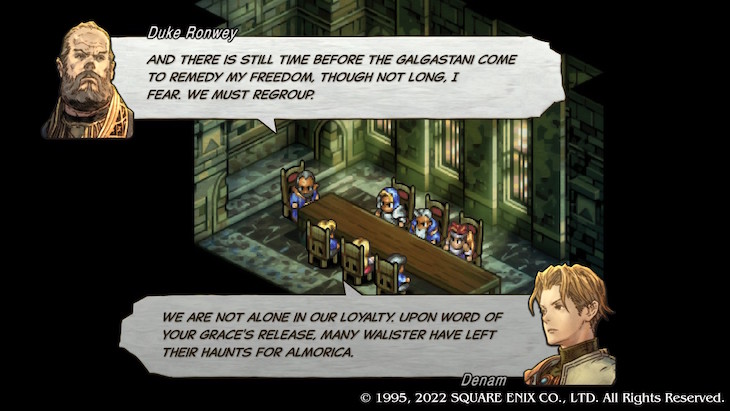
Denam and company are in a tight spot at the beginning of the game, with the Resistance almost facing defeat.
The story can be overwhelming to take at first, as you’re dropped in during a time when the Resistance is struggling and there are two potential enemies to worry about. A lot of world building will be dumped on you, and you’ll have to connect the dots on relationships between different nations, characters, and events. However, if you’re ever confused about what exactly is happening, you can consult the Warren Report which details all stories, from side stories to the main storyline.
Throughout the game, there are moments when you’ll be able to make choices. Some of these choices will appear as regular dialogue options while other choices will ask you to see where your morals line up in order to obtain peace (and these choices are pretty obvious to pick out). In total, there are three main story routes that you can go through, although there are some variations within those three endings. With the variations, it mainly comes down to special characters that you are able to recruit during your time with the game. Some of these characters are simple to get, through actions such as surviving battle, while others need to be actively recruited through a series of specific steps. Some characters also can’t be recruited on specific routes.
Tactics Ogre Reborn is a tactics RPG where you control a team of units on a grid-based board. Outside of story specific characters, like Catiua and Vyce, you are able to control your units how you see fit. For those familiar with Tactics Ogre, or other tactics games like Fire Emblem or Final Fantasy Tactics, you’ll get up to speed quickly. Along with main story combat, there are also side quests that you can take on that offer another way to gain experience as well as recruit units. Tactics Ogre Reborn also offers quite a bit of customization when it comes to team builds, character classes, and equipment/skill builds.
Combat starts the moment that you move your unit to a new location, whether it’s a single stage or a fortress. Before the battle begins, you are able to select which units to add to your team and their positions. There is a limit to the number of units that you can use per battle, so there’s no use in building up an entire army of units when you can only bring around 10 units. Once the battle has started, whichever units move first is based on their Recovery Time stat. There are a lot of factors that go into this stat, such as a unit’s class and their weight. This means that your bulkier classes such as knights move slower than archers. Of course, the tradeoff comes from the amount of damage those units can take and deal out (in some cases). This allows for more strategy in figuring out how you want to approach battles. It can also be a point of frustration if you don’t take that into account when going up against enemies with a multitude of archers and magicians.
Along with recovery time, each unit has their own movement patterns. Each stage has its own terrain, from swamps to uneven rocky terrain. There are units that can scale any heights on the map while there are other units that can maneuver into deeper water. So it does pay to play around with different unit types depending on the map to see which ones fit your play style.
Once you engage in battle against an enemy, you’ll see the damage that you’ll deal to the unit, as well as the accuracy. You can also see the enemy’s HP, MP, and element. There are up to eight elements (air, earth, lightning, water, fire, ice, light, and darkness) that a unit can be, and you change the element for any of your units. Each element has its own weakness and while you could ignore the element, taking advantage of your enemy’s weaknesses while not allowing your own to be taken advantage of is never a bad thing. Seeing all this information prior to attacking is also good for figuring out the best offensive strategy, as some units aren’t as effective against other types (archers against bulky tank bosses, for example).
When an enemy unit is defeated, a loot bag will be dropped that you or the enemy can pick up. The loot bag will usually contain items, ranging from consumables to armor. While some of these items may be useful, if you’re proactive with purchasing weapons and armor, you’ll probably find that you aren’t going to be using most of the loot that you pick up. However, it is a decent way to get some extra cash to recover that lost from consumables. When your own unit is defeated, you have three of their turns to revive them before they are gone forever. Since Tactics Ogre Reborn has permadeath, that means that there is no way to get back a unit that is killed in battle. This does add some stakes to battles, since the time and resources it takes to build up a unit is gone just like that.
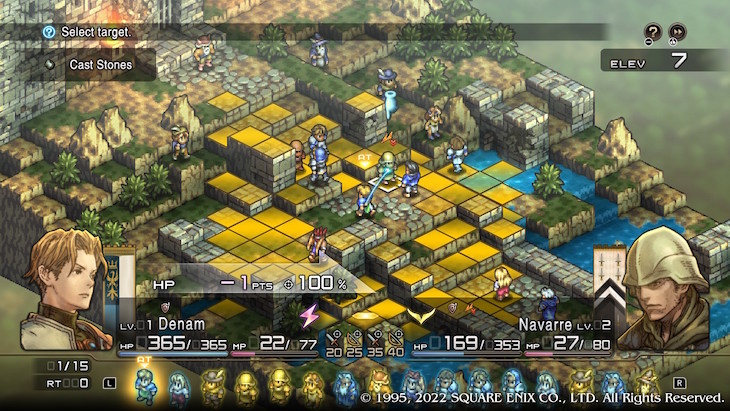
Before attacking (or being attacked), you are able to see everything from the amount of damage dealt to the accuracy of the attack.
Another thing to keep in mind with battle in Tactics Ogre Reborn is the fact that there is friendly fire. If you’re not paying close attention, you can easily deal damage to your units and even potentially kill them. This is an issue with specific units such as Beserkers, which has a passive skill that can perform an AOE to all units around them with their normal attack. These instances are avoidable, but you have to be mindful of your attacks.
Once combat has resolved, you’ll get some items including consumables, class change tickets, armor and weapons, and experience. Experience is awarded to the entire party, so just as long as a unit survives the battle, they will receive experience. And if you completed any bonus objectives, you’ll get additional experience. The bonus objectives are extremely easy to get, so long as you have a well-rounded team.
A major part of Tactics Ogre Reborn is the fact that you can hire any number of units from the shop, or recruit units during battles. There is a hard limit of 100 characters that you can have in your order. However, whether you actually want to recruit and hire to that limit comes down to how well you deal with managing those units. Since there is a limit to the number of units you can bring into battle, unless you’re changing your units up per battle, there’s not much reason to invest in such a large amount of characters.
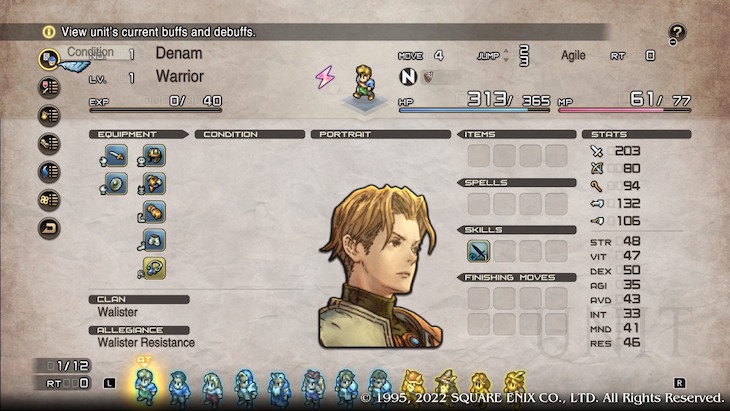
It is up to you to make sure all of your units are up to date with their equipment, items, and skills.
For every unit that you have in your order, it’s up to you to make sure each one is equipped with weapons, armor, accessories, items, skills, and unique abilities. Even if you’re not min-maxing all of your units, the management alone can still take a bit to make sure everyone is upgraded appropriately.
While it’s easy to keep in mind that there are armor and weapon upgrades, since those are constant in most RPGs, this is also the case with skills. In order to use better skills, you’ll need to purchase and equip them.
The difficulty in Tactics Ogre Reborn fluctuates as you progress through the story. There will be battles where you’re slashing through enemies with no problem before you come up against a wall with a sudden difficulty spike. In those moments, the game is testing your strategies. It’s important to make sure that all of your units are up to date with their gear, skills, and levels. However, the main point with Tactics Ogre Reborn is that you can’t grind for levels. There is an overall unit level that you can’t level past, which increases as you go through the story. For those who like to overlevel their units in order to have an easier time in later portions of the game, that strategy won’t get you anywhere.
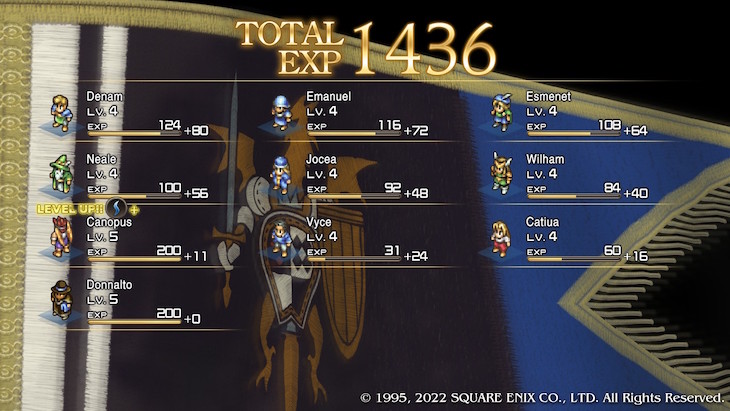
All units gain experience after a battle is concluded, but you can’t level up past the overall unit level.
Different routes also have their difficulty differences. The Chaos route is generally harder than the Lawful route, as the names suggest. However, that makes the player feel that they need to min-max much more, especially if they end up on the Chaos route with their first playthrough. It’s important in that regard to understand how your units move, which units suit which battles better, and which skills are the best to build your teams around.
When it comes to the art for Tactics Ogre Reborn, a major controversy came up with the fact that the pixel art was smoothed over, giving the characters and environments a softer look to them. Whether this was a good move comes down to personal preference at the end of the day, but it does feel as though the characters were smoothed a bit too much. The environments, on the other hand, do look very nice. It is sad though that they didn’t go with the HD-2D art style.
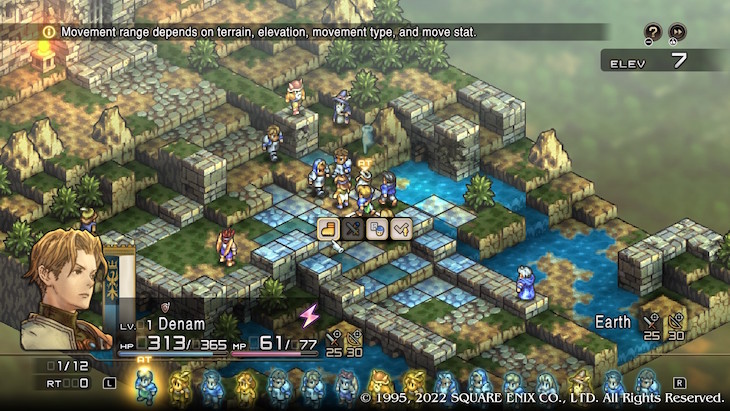
While the pixel art has been smoothed over, the character portraits retain much of their familiarity.
The character portraits, however, remain the same outside of what appears to be minor lighting touch ups. The character art is gorgeous, and although all of the regular NPC archetypes have the same art across the board, such as archers and magicians, unique characters have their own portraits to separate them.
New to this release of Tactics Ogre Reborn is the fact that cutscenes are now voice-acted. There is both English and Japanese voice acting available, both of which are really well done and feature a good range of prominent to lesser known voice actors.
The music has been re-recorded with a live orchestra, adding to the level of grandeur inside and outside of battle. Those familiar with the previous Tactics Ogre games will recognize most of the songs in their upgraded form, but there are also a few new tracks as well. As is standard with RPG music, there is a variety between the big lofty battle pieces that serve to bring tension and the more mellow string tracks that bring about feelings of melancholy.
Tactics Ogre Reborn is a meaty game that can be hard to take in all at once. There is a lot to uncover with the game, and even with this review, there’s a lot to the game that wasn’t 100% covered. For those who like extensive battle and management systems, you’ll find yourself entertained with this game. Even if you’ve played either of the previous versions, this newest remaster has a lot to offer with its updated visuals, music/audio, and combat.
The freedom the game gives you with building out your teams how you want is delightful. Being able to see how the story progresses and building out your team based on units that you can recruit or hire gives the player the sense that their choices matter. It is a double-edged sword, as there can be a lot of factors to take into account when going into battle.
Score: 8/10.